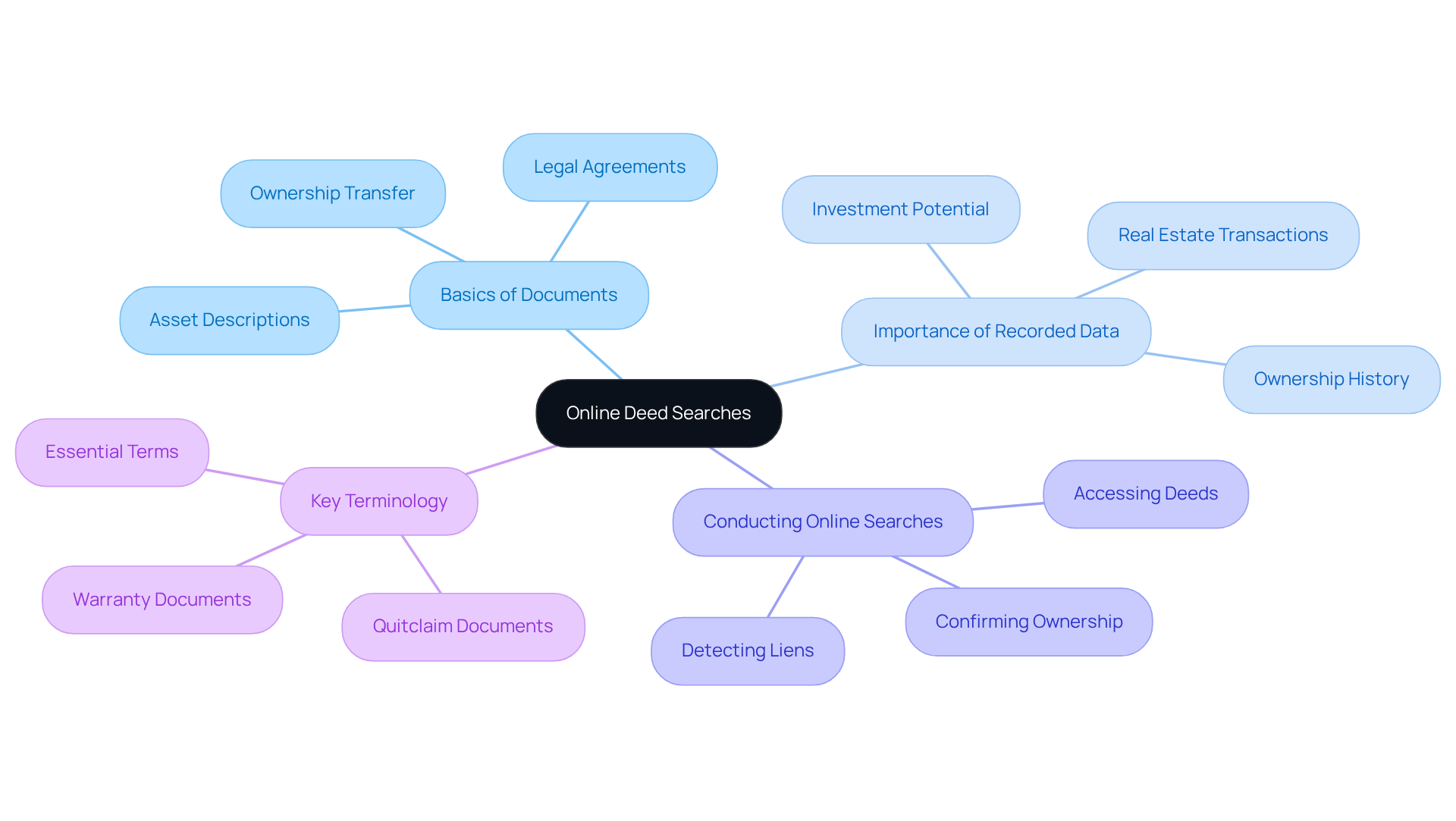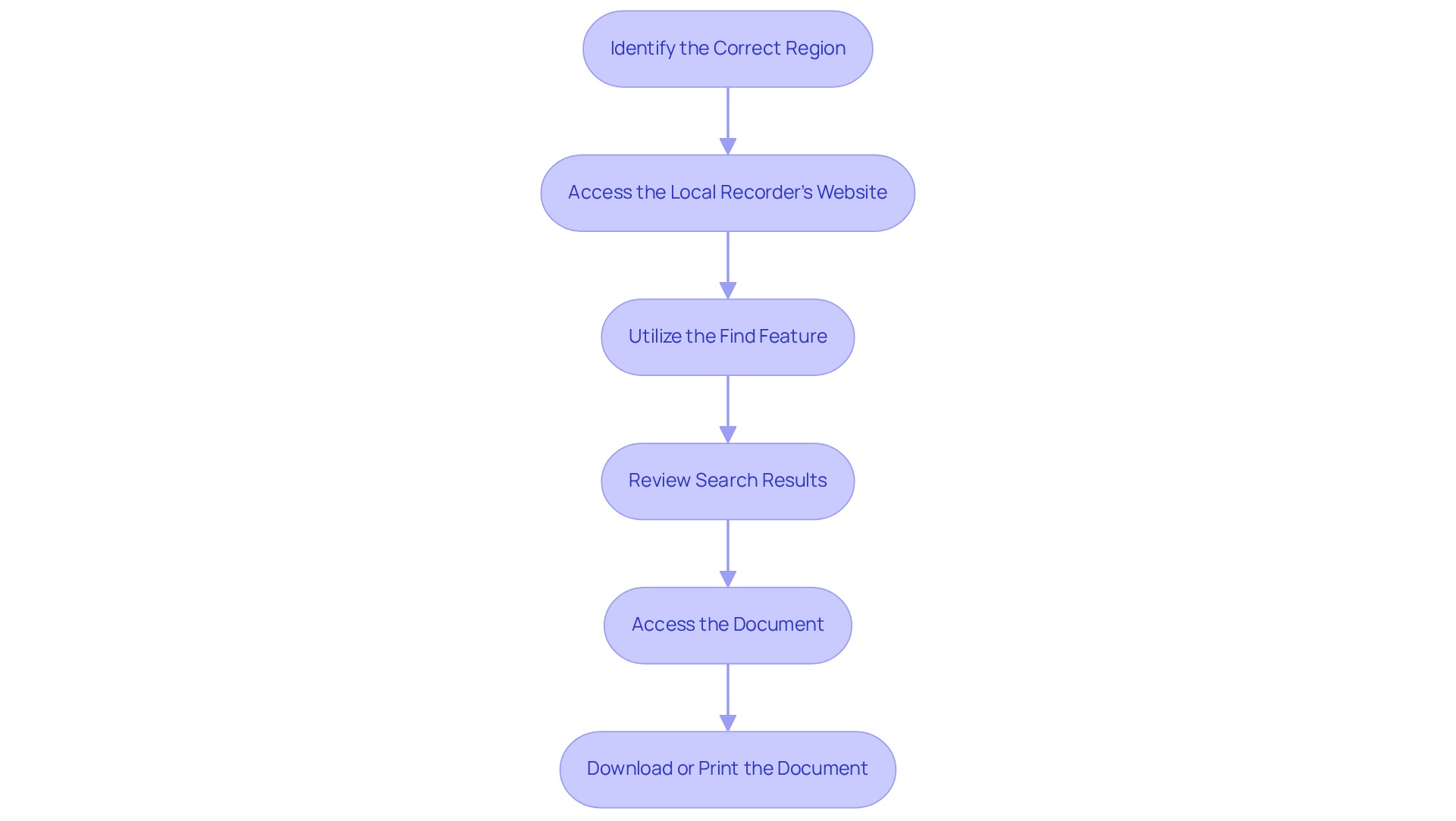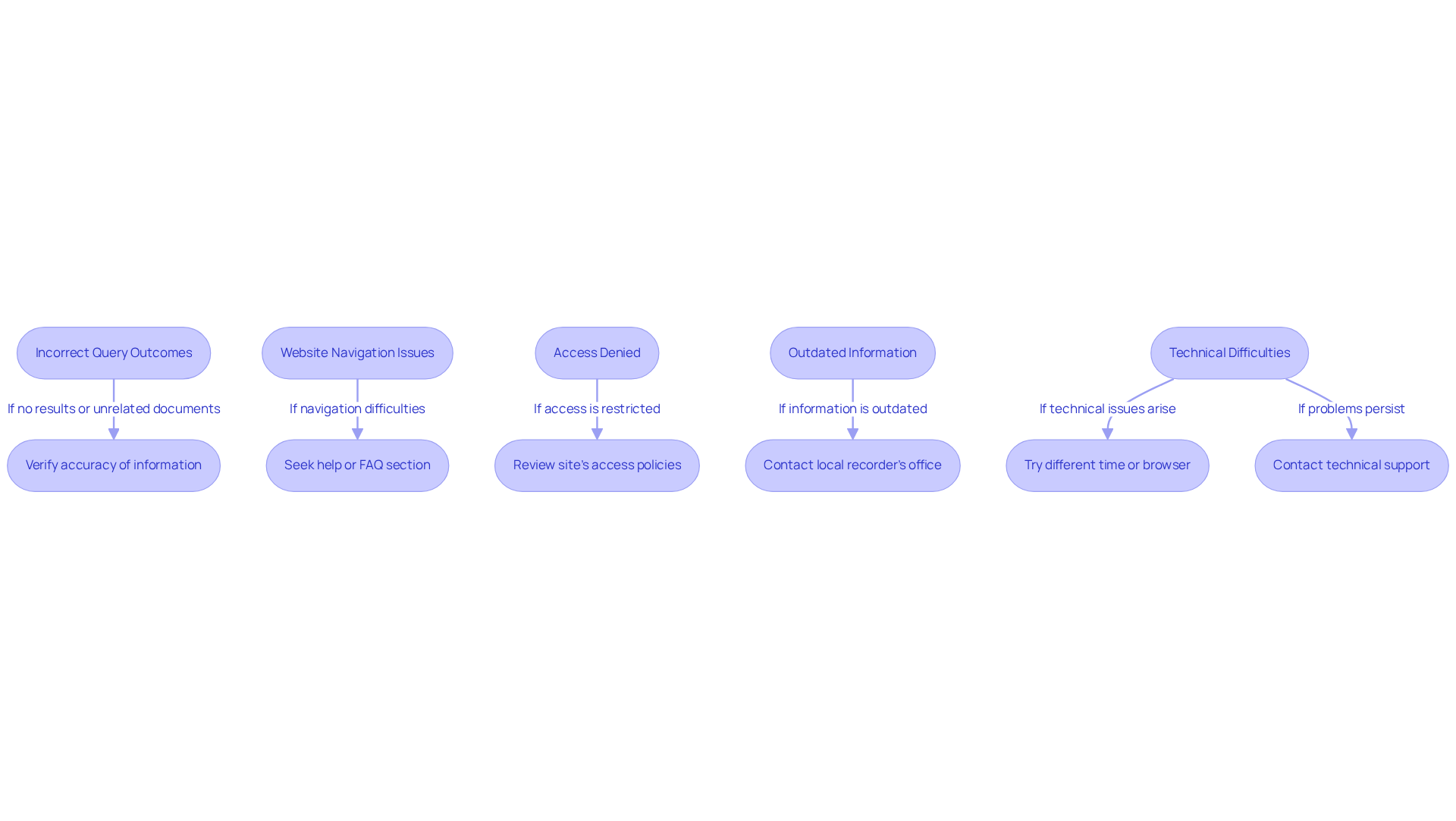Overview
The article presents an authoritative step-by-step guide on conducting online deed searches, underscoring the critical importance of accuracy and familiarity with local resources. It delineates essential steps, including:
- Identifying the appropriate region
- Accessing the local recorder's website
- Addressing common issues
Collectively, these elements facilitate efficient and effective online deed searches, empowering readers to navigate the process with confidence.
Introduction
Navigating the world of real estate can be daunting, particularly when it comes to understanding property ownership and legal documents. Online deed searches have emerged as a powerful tool, providing individuals with the ability to access critical information about real estate transactions from the comfort of their homes. This guide not only demystifies the process of searching for deeds online but also equips readers with essential strategies to overcome common challenges.
What occurs when the digital pathways to property ownership are obscured by inaccuracies or technical glitches? Discover the answers and enhance your property search experience by engaging with this comprehensive step-by-step guide.
Understand the Basics of Online Deed Searches
Grasping the basics of documents is essential before embarking on online searches. An agreement serves as a legal document that conveys ownership of real estate from one party to another, encapsulating crucial details such as the names of the individuals involved, descriptions of the asset, and any stipulations or limitations associated with the transfer.
Based on insights derived from recorded documents data, these files provide valuable information regarding real estate transactions and ownership history, which is vital for evaluating long-term investment potential. Furthermore, understanding how to search for deeds online simplifies access to these documents, aiding in the confirmation of ownership, detection of liens, and assurance of a clear property title.
Acquaintance with essential terminology and the various categories of documents—especially warranty documents and quitclaim documents—will significantly enhance your retrieval efficiency and precision. Recent trends indicate a growing reliance on digital platforms for understanding how to search for deeds online, reflecting the industry's shift towards technology-driven solutions that enhance accessibility and speed in real estate transactions.
As Suze Orman aptly stated, 'Owning a home is a keystone of wealth - both financial affluence and emotional security,' underscoring the importance of understanding deeds in real estate transactions.

Follow Step-by-Step Instructions for Searching Deeds
-
Identify the Correct Region: Begin by determining the area where the asset is located. This step is crucial, as land records are typically maintained at the local level.
-
Access the Local Recorder's Website: Navigate to the official website of the local recorder's office. Many counties, including Hamilton County, offer user-friendly online services that demonstrate how to search for deeds online, significantly enhancing the efficiency of the process.
-
Utilize the Find Feature: Search for a discovery tool on the website. You may need to provide specific details such as the real estate address, owner's name, or parcel number. For instance, the Hamilton County Auditor's site allows inquiries by entering the property address number, thereby simplifying the process.
-
Review Search Results: After entering the required information, examine the search results. Look for the document you need, which may be categorized under various types of records.
-
Access the Document: Click on the appropriate link to view the legal agreement. Note that some regions might require you to create an account or pay a fee to access certain documents, which is an important consideration when learning how to search for deeds online.
-
Download or Print the Document: If you need a copy of the document, follow the instructions to download or print it. Ensure that you save it in a secure location for future reference.
Caution: Be prepared for the possibility of needing to create an account or pay a fee, as this can vary by county.
Next Steps: After obtaining your deed, consider consulting a title research director for best practices in managing and storing your asset-related documents.

Troubleshoot Common Issues in Online Deed Searches
-
Incorrect Query Outcomes: If your inquiry yields no results or returns unrelated documents, it is crucial to verify the accuracy of the information entered. Ensure that names are spelled correctly and that the address is precise. Statistics indicate that nearly 30% of online property inquiries result in incorrect or incomplete information, underscoring the importance of accuracy in your entries. As Chirag Shivalker asserts, "Data entry errors are common in the real estate industry and can have significant impacts on business operations, revenue, and legal compliance."
-
Website Navigation Issues: If you encounter difficulties navigating the county recorder's website, seek out a help or FAQ section. Many platforms offer guidance on how to search for deeds online using their inquiry tools effectively. Real estate professionals stress that understanding how to search for deeds online can significantly alleviate frustration and enhance search efficiency.
-
Access Denied: Should access to certain documents be restricted, this may be attributed to the website's policies. Some regions require registration or payment for access to specific records. Always review the site’s access policies to comprehend any limitations.
-
Outdated Information: If the information appears outdated or inaccurate, it is advisable to contact the local recorder's office directly. They can clarify discrepancies and assist in resolving issues. Experts in the field emphasize that proactive communication with record offices often leads to quicker resolutions.
-
Technical Difficulties: For technical issues, such as website downtime, attempt to access the site at a different time or use an alternative browser. If problems persist, consider reaching out to the county's technical support for assistance. A significant number of users report that switching browsers resolves many common technical glitches. Notably, over 95% of the user market share is supported by major systems, highlighting the importance of utilizing compatible browsers.

Conclusion
Understanding how to search for deeds online is an invaluable skill that empowers individuals to navigate the complexities of property ownership with confidence. By familiarizing oneself with the essential steps and resources outlined in this guide, anyone can efficiently access vital real estate documents and verify ownership details.
The article presents a clear, step-by-step approach to conducting online deed searches, beginning with identifying the correct region and troubleshooting common issues. Key insights emphasize the importance of accurate data entry, familiarity with local recorder's websites, and understanding potential access restrictions. These elements collectively enhance the search experience, making it smoother and more effective.
Ultimately, mastering the process of searching for deeds online not only aids in confirming property ownership but also plays a crucial role in informed real estate decision-making. As the landscape of property transactions increasingly shifts towards digital solutions, embracing these practices will ensure individuals are well-equipped to manage their real estate interests. Engaging with these resources can lead to greater financial security and peace of mind in property ownership.
Frequently Asked Questions
What is the purpose of a deed in real estate transactions?
A deed serves as a legal document that conveys ownership of real estate from one party to another, including crucial details such as the names of the individuals involved, descriptions of the asset, and any stipulations or limitations associated with the transfer.
Why is it important to understand online deed searches?
Understanding online deed searches is important because it simplifies access to documents related to real estate transactions and ownership history, aiding in the confirmation of ownership, detection of liens, and assurance of a clear property title.
What kind of information can be obtained from recorded documents?
Recorded documents provide valuable information regarding real estate transactions and ownership history, which is vital for evaluating long-term investment potential.
What are some essential terms and document types to know when searching for deeds?
Essential terminology includes understanding warranty documents and quitclaim documents, which significantly enhance retrieval efficiency and precision.
How has the trend in searching for deeds changed recently?
Recent trends indicate a growing reliance on digital platforms for understanding how to search for deeds online, reflecting the industry's shift towards technology-driven solutions that enhance accessibility and speed in real estate transactions.
What is the significance of understanding deeds in the context of home ownership?
Understanding deeds is significant as it relates to the concept that owning a home is a key element of wealth, providing both financial affluence and emotional security, as highlighted by Suze Orman.




